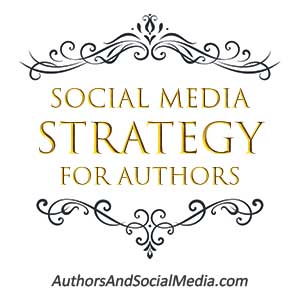Social Media Strategy for Authors: Building Your Online Presence
 In today’s digital-first world, a social media strategy for authors is essential for building a personal brand, connecting with readers, and promoting books effectively. Crafting the right strategy tailored to your goals and audience can make a significant difference in your authorial journey.
In today’s digital-first world, a social media strategy for authors is essential for building a personal brand, connecting with readers, and promoting books effectively. Crafting the right strategy tailored to your goals and audience can make a significant difference in your authorial journey.
This article about authors and social media explores how to create and execute the best social media strategies for authors, offering actionable tips, insights, and statistics to help you succeed. Written by a former literary agent, it answers common and not-so-common questions about social media for authors, including “Which Social Media Do Authors Prefer?“
Key Steps to Build a Social Media Strategy for Authors
-
Define Your Goals
Before diving into social media, identify your objectives. Ask yourself:
- Do you want to increase book sales?
- Are you building a community of readers?
- Are you looking to connect with other writers or professionals?
Having clear goals will shape your strategy and content.
-
Identify Your Target Audience
Understanding your audience is crucial for creating content that resonates. Consider:
- Demographics: What age group, gender, or geographic region are you targeting?
- Interests: What genres or topics do your readers enjoy?
- Preferred Platforms: Where does your audience spend time online? For instance:
- Instagram and TikTok appeal to younger readers.
- Facebook is popular with older, diverse demographics.
- Twitter is a hub for writers and industry professionals.
Pro Tip: Engage with your readers directly through polls or questions to better understand their preferences.
-
Choose the Right Platforms
Focus on the platforms that align with your audience and goals.
- Twitter: Ideal for networking and quick updates. Engage with the #WritingCommunity and participate in literary events like #PitMad.
- Instagram: Perfect for visual storytelling. Share book aesthetics, writing progress, and behind-the-scenes content.
- Facebook: Great for building reader communities through pages or groups. Host book clubs or live events.
- TikTok: Leverage the #BookTok trend to create engaging, short videos that promote your books.
- LinkedIn: Best for nonfiction authors and thought leaders to share expertise and connect professionally.
-
Plan Your Content
Consistency is key in social media marketing. Create a mix of content that keeps your audience engaged and aligns with your goals.
Types of Content for Authors
- Promotional Posts: Announce book launches, special offers, or upcoming events.
- Behind-the-Scenes: Share your writing process, workspace, or inspirations.
- Engaging Questions: Ask readers about their favorite books, characters, or writing tips.
- Exclusive Content: Offer sneak peeks of your work or exclusive updates for followers.
- Educational Posts: Share writing advice, industry insights, or book recommendations.
Author Social Media Idea: Use Instagram Stories to document your daily writing habits or answer questions about your book.
-
Use Visuals and Multimedia
Posts with images, videos, or infographics tend to perform better across all platforms.
- Fact: Tweets with visuals receive 150% more retweets than those without (HubSpot).
- Share book covers, character illustrations, or mood boards for upcoming projects.
- Create video teasers or read excerpts from your book to engage followers.
-
Leverage Hashtags
Hashtags increase the visibility of your posts, especially on Instagram and Twitter.
- Use genre-specific tags like #RomanceWriter or #SciFiBooks.
- Participate in trending hashtags like #BookLovers or #AmWriting.
- Engage with community-driven hashtags such as #Bookstagram and #BookTok.
-
Engage with Your Audience
Social media is a two-way street. Respond to comments, ask questions, and participate in conversations.
- Example: Host a Q&A session on Instagram Live or Twitter Spaces.
- Thank readers for reviews or recommendations and share their posts when appropriate.
-
Analyze and Adjust
Monitor your performance using analytics tools provided by platforms like Instagram Insights, Facebook Analytics, or Twitter Analytics. Track metrics like:
- Engagement rates (likes, comments, shares).
- Follower growth.
- Click-through rates to book purchase links.
Use these insights to refine your strategy and focus on what works best.
Social Media Marketing Tips for Authors
-
Create a Content Calendar
Plan posts in advance to ensure consistency. Tools like Buffer, Hootsuite, or Later can help schedule content.
-
Collaborate with Others
Partner with fellow authors or influencers for cross-promotions or joint giveaways. Collaborations expand your reach to new audiences.
-
Run Paid Ads
Consider investing in targeted ads to promote book launches or special deals. Platforms like Facebook and Instagram offer precise targeting options.
-
Join Online Communities
Participate in forums and groups like Goodreads or Reddit to connect with like-minded readers and writers.
-
Experiment with Formats
Test different types of content—videos, polls, stories, and reels—to see what resonates most with your audience.
Social Media Strategy FAQ
How often should authors post on social media?
Consistency matters more than frequency. Aim for 3–5 posts per week on your primary platform.
Do authors need paid ads?
Paid ads are not mandatory but can be effective for promoting book launches, giveaways, or special events.
How do I balance writing and social media?
Set aside specific times for social media and use scheduling tools to automate posts.
For authors just starting on social media, what’s the best way to build a following?
Consistency and authenticity are your best friends. Post regularly, interact with your audience, and use hashtags to reach new people. Share a mix of content: personal insights, writing updates, and engaging questions. Collaborating with other authors and participating in online challenges can also help you grow your network.
What kind of content should an author post to attract readers without feeling sales
Share content that entertains, informs, or inspires your audience. For example, you could post writing tips, favorite quotes, behind-the-scenes glimpses of your writing process, or character art if you write fiction. Engaging posts like polls, bookish memes, or asking readers for their input on cover designs can spark interaction without feeling like a hard sell.
Should authors automate their social media post?
Automation can be a great time-saver, especially for authors balancing multiple commitments. Tools like Buffer, Hootsuite, and Later allow you to schedule posts in advance. That said, automation should supplement, not replace, genuine engagement. Be sure to spend time responding to comments and connecting with your audience in real-time.
Should authors pay attention to analytics on social media?
Yes, analytics provide valuable insights into what’s working and what isn’t. Most platforms offer analytics tools that show metrics like engagement, reach, and follower growth. Use these insights to fine-tune your content strategy—focus on what resonates most with your audience.
Common Mistakes to Avoid
- Inconsistent Posting
Disappearing for long periods can cause followers to lose interest. Stick to a regular posting schedule.
- Over-Promotion
Excessive self-promotion can alienate your audience. Balance promotional content with value-driven posts.
- Ignoring Analytics
Failing to track performance means missing opportunities to optimize your strategy.
- Not Engaging with Followers
Social media is about connection. Ignoring comments or questions can make your audience feel undervalued.
Conclusion – Social Media Strategy for Authors
A well-executed social media strategy for authors can elevate your career, increase book sales, and foster lasting relationships with readers. By identifying your goals, choosing the right platforms, and creating engaging content, you can establish a strong online presence that supports your writing journey. Whether you’re a debut author or a seasoned writer, social media offers endless opportunities to grow your audience and share your passion for storytelling. Now that you’ve read “Social Media Strategy for Authors,” click here for the next article in this guide to social media for authors, “Author Social Media Ideas.”

 This guide about
This guide about 